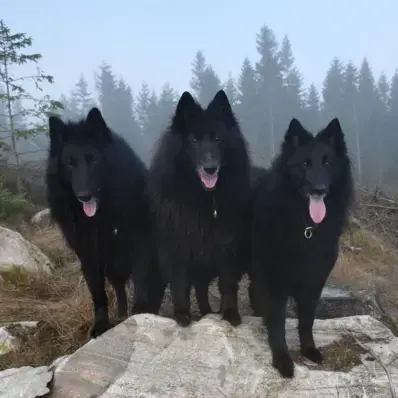Belgian Sheepdog History/Origin
Belgium’s climate and land are perfect for farming, especially for raising livestock and making dairy products. Farmers in Belgium have always focused on herding cattle, which led to the breeding of 4 different types of Belgian Shepherds.
Around the 1890s, four types of Belgian shepherd dogs were officially recognized: the Belgian Sheepdog, Malinois, Tervuren, and Laekenois. These purebred dogs all looked similar but had different coat types.
Belgian Malinois- Source: AKC.org
Belgian Tervuren-Source: AKC.org
Belgian Laekenois- Source: AKC.org
Belgian Sheepdog- Source: AKC.org
The Belgian Sheepdog, also known as the Groenendael, was named after a restaurant near Brussels where an important breeder worked.
These dogs became known for their versatility and hard work, serving as police dogs in cities like Paris and New York and even working in World War I and II. They’ve become popular for various roles, including show dogs, police dogs, and service dogs. The Belgian Sheepdog Club of America was formed in 1949. Belgian Sheepdog is recognized by the American Kennel Club (AKC) under the Herding Group.
Here is a video of a Belgian sheepdog being featured in the dog show 2023:
Belgian Sheepdog Personality
The ideal Belgian Sheepdog is one of the dog breeds described as intelligent, courageous, and loyal to its family, always in motion and vigilant. Belgian Sheepdogs are skilled at alerting their owners to potential threats. They may also display wariness towards strangers due to their herding behavior.
- Belgian Sheepdog Temperament
Proper training and socialization are essential to prevent the aggressive behavior of Belgian Sheepdog. Belgian Sheepdogs are known for their intelligent, alert, and loyal nature.
Here are some key aspects of their temperament:
- Intelligent and Alert: Belgian Sheepdogs are highly intelligent and alert, making them excellent watchdogs and quick learners in obedience training.
- Loyal and Protective: Known for their loyalty, Belgian Sheepdogs form strong bonds with their families and can be protective of their loved ones and home, making them reliable guardians.
A well-trained Belgian Sheepdog becomes a confident guardian. They remain affectionate with their family. Selecting a puppy with a friendly and curious temperament is as important, as avoiding overly shy individuals and refraining from harsh training methods.
Early socialization, including exposure to various people and environments, is crucial for developing a well-adjusted adult dog. This can be achieved through activities. These include puppy kindergarten classes, regular guest visits, and outings to different locations. These help refine their social skills.
Belgian Sheepdog Physical Appearance
The Belgian Sheepdog is a striking breed with a well-balanced, sturdy frame and an elegant yet muscular appearance. Their rich black coat with long hair, expressive eyes, triangular ears, and proud carriage give them a distinguished and regal presence.
- Belgian Sheepdog Size
At 6 months old, the Belgian Sheepdog measures 11.5 inches in height and weighs 25.0 lbs. By 12 months, their height increases to 16.5 inches, and their weight reaches 37.5 lbs. At 18 months, they stand at 22.0 inches tall and weigh 60.0 lbs.
- Coat color
The Belgian Sheepdog’s coat is long and dense, typically black with white markings on the chest, feet, tail, and muzzle. However, some Belgian Sheepdogs may also exhibit variations such as solid black, black with small patches of white, or even bi-colored coats with black and fawn.
Solid Black Belgian Sheepdog-Source: Pinterest
Here’s a quick look at Belgian Sheepdog vs. German Shepherd and Belgian Sheepdog vs Belgian Malinois:
| Characteristic | Belgian Sheepdog | German Shepherd | Belgian Malinois |
| Origin | Belgium | Germany | Belgium |
| Purpose | Herding, Police Work | Herding, Police Work | Herding, Police Work |
| Size | Medium-Large | Medium-Large | Medium-Large |
| Weight | 60-80 pounds | 50-90 pounds | 60-80 pounds |
| Coat Color | Fawn-Mahogany | Black and Tan | Fawn-Mahogany |
| Coat Type | Short | Double Coat | Short |
| Temperament | Intelligent, Loyal | Intelligent, Loyal | Intelligent, Loyal |
| Energy Levels | High | High | High |
| Trainability | Highly Trainable | Highly Trainable | Highly Trainable |
Belgian Sheepdog Gender Differences
When choosing between a male or female Belgian Sheepdog, consider these differences:
- Size
Belgian Sheepdogs are typically medium-sized to large-sized dogs, with males standing between 24 to 26 inches tall at the shoulder and females slightly smaller at 22 to 24 inches tall. They typically weigh between 60 to 75 pounds for males and 60 to 70 pounds for females.
- Shedding
Both male and female Belgian Malinois will shed heavily once a year, typically during a specific season. During this shedding period, you can expect to find even more hair around your home, as their coat naturally releases a significant amount of fur.
Belgian Sheepdog Feed/Nutrition
Feed your adult dog 2 to 3 cups of high-quality dry food daily, divided into two meals. The amount your dog needs depends on factors like size, age, build, metabolism, and activity level. Each dog is unique, and their food requirements will vary.
Naturally, a highly active dog will need more food than one that is less active. The quality of the dog food is also crucial—better food will be more nutritious, meaning you’ll need to feed less to meet your dog’s nutritional needs. Along with a balanced diet, dogs can also enjoy healthy treats like bananas and strawberries in moderation, which provide natural vitamins and nutrients.
Belgian Sheepdog Health
Ensuring your Belgian Sheepdog’s health starts with understanding potential health issues. Taking preventative measures is key to their well-being. Following a proper puppy vaccine schedule helps build a strong foundation for a long and healthy life.
- Epilepsy: Belgian Sheepdogs can have epilepsy, which leads to mild or severe seizures. These seizures might happen due to various reasons like metabolic disorders or head injuries, but sometimes the cause is unknown. While seizures can be scary, dogs with epilepsy can usually live well with proper treatment from the vet.
- Cancer: Cancer can affect dogs, much like it does humans. Treatment outcomes vary depending on the type of cancer and each dog’s specific situation. Some cancers may require surgery to remove tumors, while others may be treated with chemotherapy or a combination of surgery and medication.
- Hypothyroidism: Hypothyroidism occurs when the thyroid gland produces an insufficient amount of hormone. Signs of this condition can include infertility, weight gain, lethargy, and changes in coat and skin. Fortunately, hypothyroidism can be managed with lifelong medication, allowing affected dogs to lead normal and fulfilling lives.
Belgian Sheepdog Care and Grooming
The Belgian Sheepdog has a thick double coat. The topcoat is long and straight, while the undercoat is soft and dense, providing weather protection. They have long hair around the neck, legs, and tail.
Brushing them for 15-20 minutes weekly removes dead hair and prevents tangles. They shed year-round, with heavier shedding once a year.
Dental care is a crucial aspect of their overall well-being. Regular brushing of their teeth helps prevent dental issues and keeps their breath fresh. Introducing dental chews or toys can also contribute to oral health.
Beyond these basics, it’s important to check their ears for any signs of redness, irritation, or wax buildup. Cleaning their ears when necessary helps prevent infections.
Start grooming them as puppies to get them used to it, incorporating basic dog training tips like “sit” or “stay” to make the process smoother. Use these grooming sessions to check for any skin issues or infections, rewarding your dog for good behavior to reinforce positive associations with grooming.
Belgian Sheepdog Rescue Groups
Consider adoption from rescue groups that focus on Belgian Sheepdog. This not only gives a needy dog a loving home but also promotes responsible pet ownership.
Belgian Sheepdog Price
The price of a Belgian Sheepdog typically ranges from $1,500 to $3,000, depending on factors like breeder reputation and pedigree.
For those looking to purchase this breed, Belgian Sheepdog breeders adhere to high standards, ensuring the health and well-being of the dogs.
Interesting Facts
- The 2007 film “Surviving with Wolves” features a cameo appearance from a Belgian Sheepdog. The movie was adapted from a memoir that told the harrowing tale of a young girl who fled the Nazis and survived by living in the woods.
Surviving with Wolves- Source: IMDb
- Belgian Sheepdogs are highly intelligent and versatile, excelling in roles beyond herding such as police work and search-and-rescue operations.
Best For
Belgian Sheepdogs are intelligent and loyal companions, best suited for active households with proper training and socialization. They thrive in environments that provide regular exercise and mental stimulation.
Disclaimer: While Belgian Sheepdogs can be great companions for experienced owners, this breed is not recommended for novice families. As herding dogs, they have very high exercise needs, require significant training, and can become destructive when left alone.
Top Names
| Male Belgian Sheepdog Names | Female Belgian Sheepdog Names |
| Max | Luna |
| Duke | Bella |
| Thor | Daisy |
| Rocky | Maya |
| Zeus | Roxy |









 Belgian Malinois- Source:
Belgian Malinois- Source:  Belgian Tervuren-Source:
Belgian Tervuren-Source:  Belgian Laekenois- Source:
Belgian Laekenois- Source:  Belgian Sheepdog- Source:
Belgian Sheepdog- Source: 

 Solid Black Belgian Sheepdog-Source:
Solid Black Belgian Sheepdog-Source:  German Shepherd- Source:
German Shepherd- Source:  Belgian Malinois- Source:
Belgian Malinois- Source: 
 Surviving with Wolves- Source:
Surviving with Wolves- Source: 






